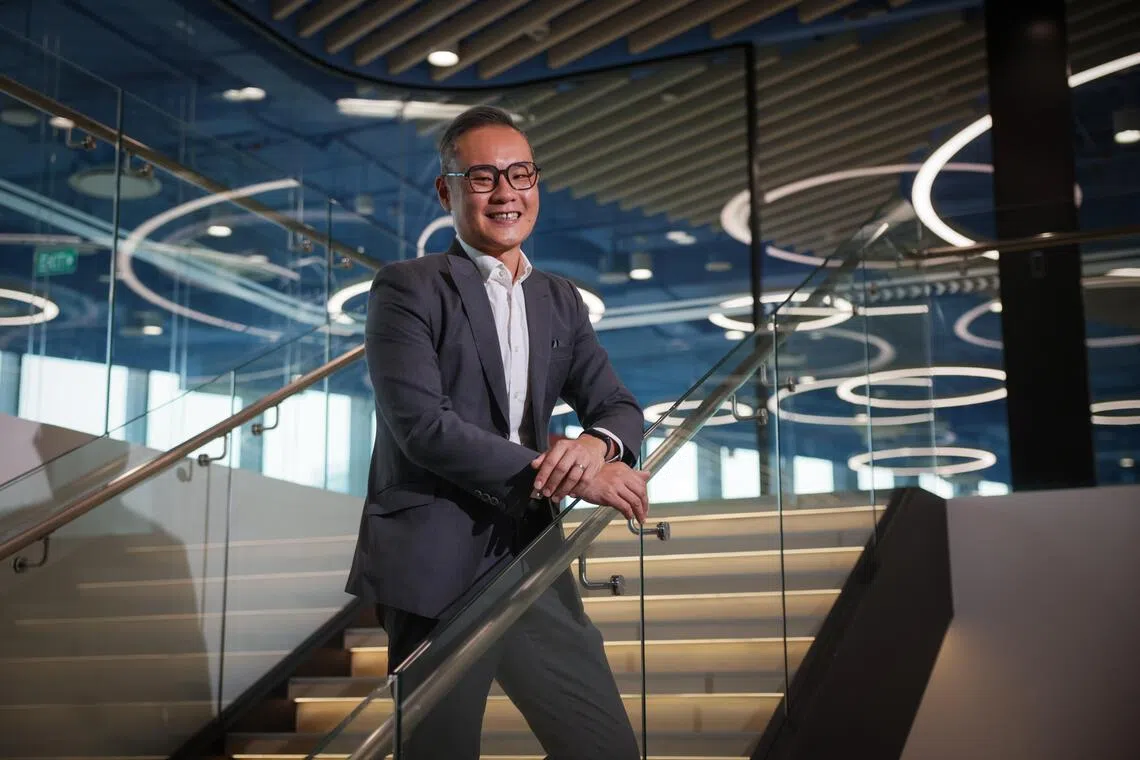SINGAPORE – As a child, Mr Kevan Chow would save up to buy stickers, playing cards and erasers emblazoned with country flags.
He also put part of the money he received for getting good grades towards a treat at McDonald’s.
The 43-year-old group chief financial officer at MariBank, a digital bank subsidiary of global consumer internet company Sea, said he has brought the essence of these practices into adulthood.
Some spending, he believes, has helped keep him on the path to reaching his financial goals, which include having enough money to retire without worries.
He said: “I’ve always felt that being able to spend on the little things that make me happy is important. It keeps me motivated, in the sense that I am able to afford certain things that I like, trivial as they may be. At the same time, I make sure that my future self is taken care of.”
Now, he enjoys buying posters featuring the Japanese anime franchise Dragon Ball. He has also amassed a collection of Nike Jordan sneakers, a nod to his love for playing basketball.
Mr Chow holds a bachelor’s degree in business administration from the National University of Singapore. He spent more than a decade at traditional financial institutions Citi and Standard Chartered before joining Sea in 2021.
He now oversees the finance function at MariBank and the firm’s April 2025 acquisition, MariBank Philippines, with the goal of providing banking products to digital natives and small businesses.
Mr Chow and his wife have a seven-year-old samoyed, a dog breed originating from the Arctic regions of Siberia. The “pawrent” has stopped wearing black suits because of the way the dog’s white fur looks against the colour.
A: I am a balanced investor. I have a portfolio of funds, stocks and bonds as well as some cryptocurrency. The key things I look for are liquidity, stability and flexibility. I do take calculated risks. Besides cryptocurrency, I have some higher-risk assets like structured products.
A: When I was growing up, I always heard stories about my grandmother once being well-to-do. She owned properties in the east side of Singapore, but she made some bad decisions and lost most of her money. I am sure those experiences shaped how my dad managed his finances. It was motivation for him to do more to bring stability to the family, by growing in his career and wealth.
When I was born, my family was quite modest. My dad was a bank teller who took calculated risks. My mum was a police officer and very risk-averse, being a civil servant. I am a mix of both in terms of my investing philosophy. I always save for a rainy day, but I know that it is important to take calculated risks from time to time.
The stories never really impacted how I viewed my grandma or how I interacted with her. Everyone makes mistakes. Personally, it served as a warning that certain things, especially wealth, can come and go easily, and how you manage them is very important.
A: My stock portfolio. I view property as less of an investment than a place to live. Maybe that is the conservative influence that my mum had on me. When I look at a property, I ask myself whether it is a place that I would eventually be all right living in, rather than purely considering the potential returns.
A: My first experience with cryptocurrency was not very pleasant. I first invested in crypto during the Covid-19 pandemic when there was hype. On the recommendation of my friend, we invested in a lesser-known cryptocurrency that, honestly, at that time, I did not know much about.
Initially, it paid off quite nicely. At its peak, the return on our investment, which was not a large amount, went up by around 2,000 per cent, or 20 times. We did not recognise that this was the peak and did not know its value was going to come down.
Today, that cryptocurrency is worth a fraction of what it was back then. This was the last time that I invested in something that I was not familiar with. I ensured that my investments moving forward were grounded in fundamentals rather than short-term momentum.
A: It was staying invested and not having extreme reactions during bull or bear markets. This is not always easy. As an investor in a bull market, you always ask yourself: Does the run still have legs? During a bear market, you ask yourself whether you should stay away. But staying the course resulted in some of the best decisions I have made.
A: I am now living with my parents at a terraced house in Loyang because I just bought a new apartment that will be ready only in 2027. I thought it would be good to live with my parents, who are getting on in age, for a while, as I was based overseas for a period of time during the pandemic.
A: I drive a Nissan Infiniti QX30. I won’t say I am really into spending on cars, as I look for value and a model that I like.
A: It would be completely unplanned and unscheduled – just going around with my wife and dog, doing whatever we feel like.
A: Very cliche, but I would definitely invest it. My wife and I also have a soft spot for stray dogs and cats, so I would portion some of the money to help out in this area. We have been thinking of starting our own shelter and these plans are in the works.
A: I would think about how long I can survive with this $100, so I know how much time I have to rebuild my income stream and get back on my feet.

